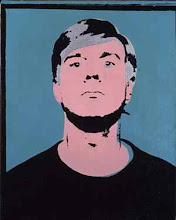 |
| Helen Frankenthaler, Mountains and Sea, 1952 |
Frankenthaler has an assured place in C20 art history: her 1952 painting, Mountains and Sea, is credited with launching a new movement: Post-Painterly Abstraction or Colour Field Painting. William Agee has described the genesis of the painting:
In August 1952, Ms. Frankenthaler traveled to Nova Scotia, where she continued her practice of doing small landscapes. She painted in watercolor and oil on paper, working freely from nature. These studies helped to keep her limber and flexible, like a dancer or athlete tuning up or, as was the case here, a painter preparing for a major new effort.
On the afternoon of Oct. 29, back in New York, she tacked a large—roughly 7-by-10-foot—piece of untreated canvas to the floor of her studio to begin the largest painting she had ever undertaken. Her mind and her arms were filled with memories of the spectacular Cape Breton landscape. After roughing in a few charcoal marks as an initial guide, she poured highly thinned oil paint from coffee cans directly onto the canvas, as if she were drawing with color. She had no plan; she just worked, with control and discipline. At the end of the afternoon, when she had finished, she climbed on a ladder and studied the painting. She was not yet sure what she had done; she was “sort of amazed and surprised and interested.” … It soon became clear that what she had done was invent a new way of making art. (Quoted from article by James Panero in The New Criterion)
Frankenthaler continued to produce lyrical and luminous abstracts through six decades - an achievement that was celebrated by an exhibition, Frankenthaler at 80: Six Decades, in 1980.
 |
| Helen Frankenthaler, Western Dream, 1957 |
 |
| Helen Frankenthaler, Nature Abhors a Vacuum, 1973 |
 |
| Helen Frankenthaler, Viewpoint II, 1979 |
 |
| Helen Frankenthaler, A Green Thought in a Green Shade, 1981 |
 |
| Helen Frankenthaler, Driving East, 2002 |








No comments:
Post a Comment